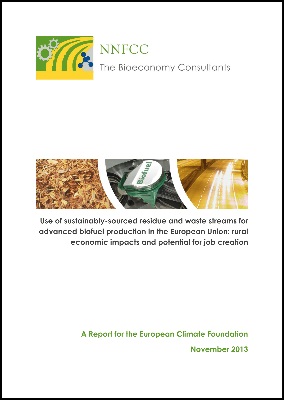Highlights
- Analysis of the economic viability of using crop, forest and waste residues as feedstocks for biofuel production.
- Covers a range of advanced conversion technologies, including cellulosic ethanol, gasification and fermentation.
- Potential economic benefits and job creation opportunities within the EU.
- Evaluation of sustainably harvestable crop, forest residues and residual waste arising in the EU, which could be accessed without affecting other traditional markets.
Reasons to read
- For investors and developers to assess economic feasibility of a range of advanced biofuel conversion technologies
- To inform investors and developers of the most sustainable and viable wastes and residues in Europe to strengthen supply chains, particularly to comply with increasingly stringent sustainability criteria for renewable energy incentives
Number of pages: 52
Accessibility: This item is free to download
Summary
 Expansion in the use of biofuels driven by the European Union’s Renewable Energy Directive (RED) has led to concerns that this may be contributing to deforestation and land use change.
Expansion in the use of biofuels driven by the European Union’s Renewable Energy Directive (RED) has led to concerns that this may be contributing to deforestation and land use change.
This uncertainty has tempered EU biofuel ambitions, particularly for crop-derived biofuels. This report highlights the significant economic and employment opportunity that exploitation of crop, forest and waste-derived residues could offer in the EU.This has led to increased interest in the potential for use of non-food feedstocks for biofuel production such as crop and forest residues and other waste streams. There is currently uncertainty over the level of biofuel production that could be supported by such feedstocks, whether such biofuel production is economically feasible and in-turn the potential economic and job benefits that could arise if development of such fuels was supported.
NNFCC was engaged by the European Climate Foundation, supported by a group of industry and NGO interests to analyse the economic viability of using crop, forest and waste residues as feedstocks for biofuel production utilising a range of advanced conversion technologies. NNFCC further examined the potential economic benefits and job creation opportunities that could arise from exploiting these resources within the EU. This analysis draws on parallel commissioned work by the International Council on Clean Transport to assess the amount of sustainably harvestable crop and forest residues and residual waste arisings in the EU that could be accessed for biofuel production without affecting other traditional markets.
You may also be interested in:
Talk to the experts
For business solutions call NNFCC on +44 (0)1904 435 182 or email
enquiries@nnfcc.co.uk